

Each of the 12 Tribes has its own unique ability. Use their abilities wisely and you will soon be the new Lord of Ethnos! Remember that only the Leader of a Band of Allies is allowed to use its ability.
Tribe Of Centaurs
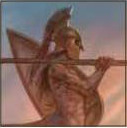
Always swift on their hooves, the Tribe of Centaurs is a group of proud warriors that roam the land far and wide. Many enemies have fallen prey to their wellcoordinated surprise attacks.
By the time they can hear their thundering gallop, it's usually too late.
If you make a Centaur the Leader of a Band of Allies, and you are able to place a Control marker on a Kingdom for that Band, you may immediately play another Band of Allies from your hand-before you discard the rest of your cards-possibly placing another Control marker and using the second Band's Leader ability.
For example, if you play a Band of 2 Allies with a blue Centaur Leader, and this allows you to add a Control marker to Straton, you can then play another Band of Allies with a red Orc Leader, adding a Control marker to Rhea and using its ability to add another marker on the red space of your Orc Horde Board.
Tribe Of Dwarves
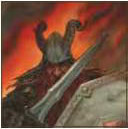
Deep in their mountain fastnesses, the Tribe of Dwarves prizes from the earth treasures and precious things that are the wonder of the Six Kingdoms. For an entire Age, they will count and gather their riches, for great wealth is its own form of glory.
During the scoring at the end of the Age, any Band of Allies that has a Dwarf Leader awards Glory as if it had one more card in it.
For example, if you have a Band of 4 cards with a Dwarf Leader, that Band is worth 10 Glory at the end of the Age, as if it had 5 cards in it.
Tribe Of Elves
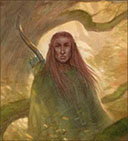
The Elves of the Six Kingdoms have always lived in harmony with the land, learning to ride the rhythms of nature, and never wasting anything of value when it can be conserved for use in the future.
If you choose an Elf to lead a Band of Allies, you may keep a number of cards in your hand equal to the number of cards in the Band you just played, instead of discarding them face up on the table.
For example, if you have 7 cards in your hand and you play a Band of 3 Allies with an Elf Leader, you can keep 3 of your remaining 4 cards and only discard a single card.
Tribe Of Giants

It is no doubt obvious that among the Tribe of Giants, size really does matter. Giants continue to grow throughout their lives, and no one has ever been able to prove that there is a limit to their size. Which is fortunate, as this is how the Tribe of Giants chooses their king: the largest Giant rules.
If your Band of Allies has a Giant for a Leader, check to see if you now have the largest Band with a Giant Leader. If you do, you immediately gain 2 Glory on the Glory Track and you take the Giant token and place it on your new Band. Another player can take the Giant token away from you only if they play a larger Band with a Giant Leader.
Even the same player may move the Giant token from one of his Bands to a larger one, gaining another 2 Glory. At the end of the Age, you gain extra Glory if you still hold the Giant token, the value depending on which Age has ended (as indicated on the token). Then the Giant token returns to the side of the board to be used in the next Age.
For Example, if you play a Band of 3 Allies with a Giant Leader, and that is the largest Giant-led Band this Age, you can take the Giant token to mark that Band and gain 2 Glory. Later on, another player can play a Band of 4 Allies with a Giant Leader and take the Giant token away from you for their own Band, earning 2 Glory as well.
If you hold the Giant token at the end of the First Age, you earn 2 Glory before returning the token to the side of the game board.
Tribe Of Halflings
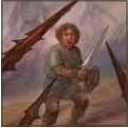
The humble folk that make up the Tribe of Halflings hardly conjure up an image of boldness. No warrior would follow these tiny farmers and merchants, so they are never seen in positions of leadership.
Yet, many a would-be ruler has been surprised to look around and find them everywhere.
If you choose a Halfling as the Leader of a Band of Allies, you do not get to place any Control markers on the board, regardless of the size of your Band. However, the Tribe of Halflings is twice the size of any other Tribe, making it easier to create larger Bands, which are worth more Glory at the end of the Age.
Tribe Of Merfolk

If anyone can say what lies beyond the borders of the Six Kingdoms, across the waves that surround the land, it is the Merfolk. Always, they are searching for new discoveries. Those who befriend this inquisitive Tribe are often delighted to discover that their friends have brought them some trinket from a far-off place- something no one has ever seen before.
When you use a Merfolk as the Leader of a Band of Allies, in addition to placing a Control marker (if you can), move your marker on the Merfolk board up a number of spaces equal to the number of cards in the Band you just played. If you reach or pass a space with a marker symbol, you may also place another one of your Control markers on any Kingdom, regardless of the size of your Band.
At the end of each Age, the highest-ranking players on the Merfolk board earn Glory as if it were its own Kingdom. The Merfolk board is never reset, so if a player reaches the last space, their marker can no longer be moved.
For Example, if you play a Band of 3 Allies with a green Merfolk Leader, you can place a Control marker in Althea (if you had 2 or fewer markers there already), and move your Control marker up 3 spaces on the Merfolk board.
If your token lands on the "3" space, which has a marker symbol, you can then place a second Control marker on any Kingdom (not just Althea), even a Kingdom where you already have 3 or more tokens.
If your marker on the Merfolk board is the highest at the end of the First Age, you gain 1 Glory.
Tribe Of Minotaurs
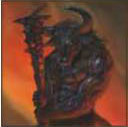
Though their visage is bestial and their reputation cruel, the Minotaurs of the Six Kingdoms are mighty at war and productive in peacetime. Their herd-like instincts enable them to work together, accomplishing much more than their numbers would suggest.
If you choose a Minotaur to be the Leader of a Band of Allies, you need one less card than normal to place your Control marker in the matching Kingdom.
For example, if you have 3 Control markers in Rhea, you can add a fourth marker there by playing a Band with a red Minotaur Leader consisting of just 3 cards.
Tribe Of Orcs
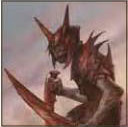
The most migratory of Tribes, it is against the nature of Orcs to remain in one place for long. On the one hand, it teaches them to dispose of all unnecessary possessions. After all, who wants to carry furniture you're never going to use? On the other hand, it does breed a certain kind of jealousy, and when a horde of Orcs grows big enough, they find it hard not to "liberate" some pretty things… If you choose an Orc as the Leader of a Band of Allies, you may place one of your Control markers on your Orc Horde board in the space that matches the color of your Orc Leader (in addition to any Control marker you may be able to place in a Kingdom). You can only have one Control marker in each space on your Orc Horde board.
At the end of the Age, you may empty your Orc Horde to have them go pillaging. If you do, you score Glory based on the number of Control markers you removed, as shown on your Orc Horde board. Or you can leave your markers there to try to score higher in a later Age.
For example, if you play a Band of Allies with an orange Orc Leader, you can place a Control marker in Ithys (if your Band is large enough) and a second marker on the orange space of your Orc Horde board.
If you have a total of 3 markers on your Orc Horde board at the end of any Age, you can remove them to earn 6 Glory.
Tribe Of Skeletons
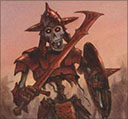
The biggest mystery that surrounds the Tribe of Skeletons is where, exactly, they come from. No one has ever admitted to animating the remains of the dead. And yet, these creatures will happily follow anyone that gives them a direction. Sadly, despite their loyalty and devotion, without powerful magic, Skeletons cannot remain intact, and the chaos surrounding the end of an Age always disrupts their animation.
Unlike other Tribes, Skeletons can never be the Leader of a Band of Allies. But Skeletons are treated as a "wild card": you can add them to any Band regardless of their color or Tribe. They count towards the ability of the Leader of their Band and for achieving the necessary card number to place your Control marker on a Kingdom, as normal.
However, Skeletons are brittle and can survive only through powerful magic. As a result, at the end of every Age, all Skeletons, wherever they are, must be discarded before awarding Glory for the Bands of Allies.
For example, if you have a Band of 5 Allies that includes 2 Skeletons, at the end of the Age those Skeletons are discarded, and you only score Glory for the 3 cards left behind.
Tribe Of Trolls
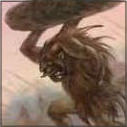
The Tribe of Trolls is widely feared and respected, mostly due to their habit of tearing those who disagree with them to pieces. The most heated disputes tend to get resolved without much contention when one of the parties involved has a horde of angry Trolls at their side.
When the Leader of your Band of Allies is a Troll, you may take any one unclaimed Troll token with a value up to the number of cards in the Band you just played. Troll tokens have no value in themselves, but they are used to break ties for control of the Kingdoms at the end of the Age. The tied player with the highest total value of Troll tokens wins the tie. If still tied, the higher numbered Troll token wins the tie.
At the end of each Age, all Troll tokens are placed back next to the main game board for the next Age.
For example, if you play a Band of 4 Allies with a Troll Leader, in addition to possibly placing a Control marker on a Kingdom, you can take any available Troll token with a value of 4 or less. If you are tied for control of a Kingdom at the end of the Age, and the total added value of your Troll tokens is higher than the other player's, you win the higher Glory for that Kingdom.
Tribe Of Wingfolk

From their mountain aeries, the noble Wingfolk soar across the Six Kingdoms, always watchful for threats to their homes. In times of strife, this knowledge serves them well: they always know the weaknesses of their enemies.
If your Band of Allies is led by a Wingfolk Leader, you may place your Control marker in any Kingdom on the game board (your Band must still be large enough to play a marker in your chosen Kingdom), ignoring the color of your Leader card.
For example, if you play a Band of 3 Allies with a purple Leader, you would normally only be able to place a Control marker in Duris. But if that Leader is a Wingfolk, you can place your Control marker in any Kingdom where you have 2 or fewer Control markers.
Tribe Of Wizards

None can say from whence the Wizards came, only that these secretive arcanists have walked the Six Kingdoms since the Age of Creation and that they know many secrets that they do not share.
When the time is right, though, a secret whispered in the right ear can recruit more allies than the most bombastic speech.
If a Wizard leads your Band of Allies, after you discard any other cards in your hand, you may draw a number of cards from the Allies Deck equal to the number of cards in the Band you just played. You cannot draw these cards from the face up cards on the table.
For example, if you have 4 cards in your hand and you play a Band of 2 Allies with a Wizard Leader, after you discard your 2 leftover cards, you can draw 2 new cards from the Allies Deck.
Continue Reading
